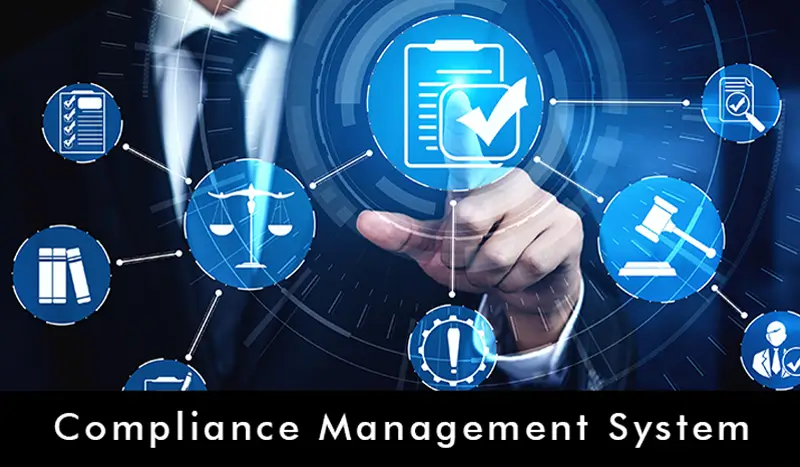Compliance means adhering to a rule like policy, standard, specification or law. Compliance management system defines the standards to comply with government rules and regulations to run a business more smoothly and to avoid all types of risks associated with your business-It provides benediction from the escalation of regulations and from a constant barrage of new guidelines to adhere to. This system helps in solving the problems by giving a defensive mechanism to protect the business from risk related to any fraudulent activities and protect them from external factors.
With the rapid growth of technology gone are those days when we manually put all the inputs of data. Now automation has made it easy for us to regulate and to avoid any risks which are done through a manual process. So having a robust compliance management system helps in managing regulations, policy and audits in a more transparent way.
While there are a plethora of problems in compliance management system but before that, like every other machinery requires nuts and bolts to function the machine and run smoothly, like that compliance management system is very essential for business otherwise it will be vulnerable to operate the business and will ultimately lead to more risk.
Compliance management includes ensuring system-based records of internal and external audits, document management system, records and artifacts over a period of time, KPIs, DMS, Dashboard for all Quality parameters, etc. One must have internal control over the complete quality initiatives vis-à-vis needs from different quality certifications mandated documentation, and this can be done efficiently and effectively by using a software-based Compliance Management System.
Why Compliance is important
“Compliance does not foster innovation, trust does. You can’t sustain long-term innovation, for example, in a climate of distrust”– Stephen Covey
1. Compliance Builds on Trust
Trust is earned with dedicated actions and without trust, everything will break apart. Organizations are trusted with dedicated rules and regulations that happen in the organization. By adhering to legal formalities the organizations are trusted and following it requires lots of work without that trust-breaking apart. The commitments made and by following to the legal formalities the organization makes sure that organization is trustable and is the place for good opportunities and maintaining its ethics and avoid any fraudulent activities.
2. Compliance Builds on Reputations
There is a saying by Warren Buffet “That it takes 20 years to build a reputation and 5 minutes to ruin it.” Reputation plays a vital role for any organization which helps in improving the creditability of any organization. It creates a positive image in the marketplace and in the minds of customers. An organization tries to protect its reputation through proper compliance in the organization; compliance acts as a defense system for the organization and avoids any illegal activities or unhealthy practices happening in the organization.
3. Compliance Reduces Risk
It reduces risk in your business by facilitating the right actions and clear understanding. An organization’s performance is always challenged by internal threats more than external threats and compliance exposes unacceptable conduct. The code of conduct stems from values and aligned values drive company growth.
4. Compliance avoids legal liabilities
No company or organization wants non-compliance in their business and pummel with legal liabilities. There are punishments like charges of heavy fines, penalties, and infringement for not adhering to the law and avoiding compliance which great bad reputation in the marketplace, and with that colossal of trouble will happen to your business.
Rule of thumb describes that creating a good public image is necessary to sustain in the market and applying compliance into the business will protect you from lots of trouble. Trust, Loyalty, and Goodwill are important factors for a business to run it smoothly and peacefully and compliance keeps checks on it all the time.
Statistics based on 2020 report for compliance
1. Regular compliance audits saved businesses $2.86 million on average
2. Enabling governance, risk, and compliance technologies saved businesses $1.43 million on average
3. Approximately 2.77% of companies reported a data breach over the past fifteen years
4. Companies that enabled compliance technology saved an average of $1.45 million in compliance costs
5. The average compliance cost for organizations across all industries worldwide is $5.47 million
6. Fines and penalties are the least costly consequences of a data breach
Problems associated with Compliance Management System Risk Assessment
1. Lack of Understanding
Businesses usually don’t give much importance to a regulatory compliance management system and they are less aware of the fact that why they need compliance management in the first place- Firstly there should be an expert who should manage all the compliance and with that, a leader is much more important to envision what is compliance management, why compliance management system is required and what is the importance of it. Like the nuts and bolts work together to ensure the seamless working of a machine. Strong leadership, internal communication, and synergy in between the business lead to an iterative process.
2. Manual Process
Persisting of too many manual processes leads to difficulty in Perpetuating dispersal and fragmentation of data. The inefficiency of handling a wide variety of data leads to complicacy in processes. The use of archaic processes to manage data leads to a delayed workforce process, which is alarming for businesses.
3. Lack of Framework
The compliance management framework is critical in an organization for a flexible working environment. A correct design of framework in a compliance management system will lead to a strong crutch for the organization in any changes with government laws and regulations.
CONCLUSION
Managing a strong compliance management system risk assessment is necessary for the organization, and apart from that, an expert is required in the organization to manage risks and audits, which is critical in establishing good compliance in the organization. Having a strong compliance Management System helps in creating a good impact in business. If you are looking to strengthen your Quality function and assurance for compliance to quality standards like ISO, QMS, ISMS, etc. Reach out to us today!







